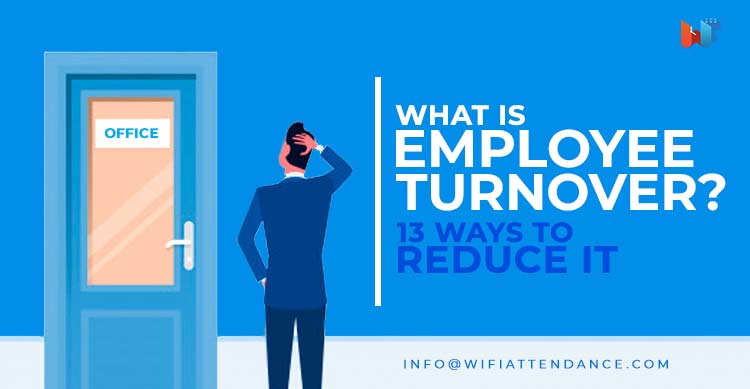What is Employee turnover
Employee turnover is the number of employees that leave the organization and are replaced by new employees. A high attrition rate means that the Employee turnover calculation will produce a larger number.
It is essential for an organization to timely calculate the Employee turnover to understand its attrition rate and create and implement corrective measures.
Read Also: 15 Tips For HR Managers To Create A Sustainable Company Culture
Higher Employee turnover is a great concern to organizations since there is a cost involved in hiring, training, and retaining an employee.
This money is washed down the drain when the employee decides to let go of the organization.
Types of Employee turnover
There are different reasons why an employee would leave an organization. The kind of Employee turnover depends on the reason why the employee was let go.
1. Involuntary Employee Turnover
Involuntary termination of an employee for reasons such as poor performance, not adhering to company policies, extensive absence from work, etc.,
2. Voluntary Employee Turnover
When an employee voluntarily releases themselves from the organization for reasons such as joining a different company, relocating to a different city, higher studies, etc.,
3. Desirable Turnover
This is one of those instances where Turnover is not considered as a negative factor. In occasions where an underperforming employee is replaced with an employee that exceeds the expectation of the organization, it is regarded asa Desirable Turnover.
4. Undesirable Turnover
When a company is losing employees, who have always exceeded the company expectation and have shown potential work throughout their career.
How is Employee turnover calculated?
There are different calculations to derive the Employee turnover percentage. The simplest and widely used options are mentioned below. All we need are 3 data points:
- The number of employees in the beginning (B)
- The number of employees in the end (E)
- The number of employees that left during this period (L)
Number of employees who left the organization
Employee turnover % = ————————————————————— X 100
(Number of employees in Beginning + Ending) / 2
Tips to reduce the Employee turnover percentage
1. Hiring
Select the right candidate for the right role. All’s well that begins well. Choosing a candidate that is not the perfect fit for the role will obviously make it harder for the employee and employer to function appropriately.
2. Recognizing candidate potential during interviews
Stressing, on the first point, does not mean that makes the hiring process so narrow that you miss out hiring talented candidates. Remember, if not for the programme you are currently hiring, you may use the candidate for a different programme in your organization.
It is also possible that you may train the candidate to suit the requirements of the programme. As long as this works, well and good. It is a call you as a recruiter need to take during the hiring process.
3. Compensation
One of the main reasons for Employee turnover is compensation. It is important to provide the right compensation to the right employee.
Compensation does not necessarily mean only the basic salary. There could be options such as Incentives, Bonus, Health benefits, etc., that can work as both compensation and motivation towards working better.
Read Also: 15 Things HR Manager Must Consider When Dealing With Family Leave
There are also surveys that show that many Millennials refrain from taking up jobs that do not pay them well. They seem to have learnt the lesson from their parent’s careers. Decent remuneration quals reduced Employee turnover.
4. Buddy system
Every organization has a training programme and dedicated trainers to perform these pieces of training. While this is a definite winner, it will also help if employees can share knowledge with their peers through the training session or buddy system.
This will help employees improve their knowledge through discussions and mutual help.
Buddy system or assigning older employees to monitor newbies will also instil a sense of satisfaction in their minds since monitoring over the new-hires is more like a progression within the organization and employees think that they are being recognized for their talents.
5. Respect employees
It is vital for the managers to show their respect towards their subordinates. Realize their potential and include them in the decision-making process.
Employees are not a fan of the idea of conclusions being made for them. They are the most integral part of the programme and hence will have more ideas and feedback about the programme. As a manager, it is crucial that you implement their feedback and suggestions.
It is also easier to create proactive processes to ensure that negative customer impacts, such as customer dissatisfaction and complains, does not arise.
Employees tend to stick around longer when they know that their voice is heard.
6. Positive feedback
Everyone is all about giving constructive criticism and feedback when something isn’t going right. However, it is also important to share feedback when the employee is doing it right.
Positive feedback works as praise and appreciation. A 2-minute casual talk with an employee on how they are doing it right will go a long way.
Recognition is one of the significant ways to retain an employee and reduce Employee turnover.
7. Fun at work
A great way to retain employees is having fun at work. It is often seen that the Employee turnover percentage is lower in organizations that have regular fun activities at work when compared to those who don’t.
Considering that they spend most of their time in the office, it is ideal for the organization to invest time and effort in conducting programme / individual-centric fun activities.
Some employees state that compensation takes a back seat in companies that takes time and effort to improve the employee’s happy quotient.
8. Work-Life balance
Spending most of their time at work is not some anyone enjoys. It is vital for any organization to understand and act on it.
Flexible hours, Work from Home options,etc., are some of the policies an organization could have. Remember, their child’s fancy dress competition is just as important as work.
9. Rewards and Recognition
Employee turnover is higher in organizations that do not follow a regular Rewards and Recognition Plan. It is vital for employees to know that the organization recognizethem.
It is also vital to ensure that undeserving employees do not receive rewards from upper management. This will impact employees more negatively than not receiving any rewards at all.
10. Bonus according to corporate bonus
There is no harm in following a limitless bonus programme. As a matter of fact, this opens up various opportunities to the employees. They also understand that you, as an organization, trust them.
When there is a business profit, a part of it can be paid to the employees. This will only motivate them better to work towards the organization’s vision; meaning, more business profits.
It will also help to celebrate achieving such organizational milestones with the employees. This does not have to be a costly affair; buying breakfast for your employees would do too.
11. Forecasting
Overtime is one of the significant issues employees face in an organization. Forecasting and staffing accordingly will ensure such situations does not come up. Even if it does, you can explain it to the employees so that they are prepared.
If it is absolutely required for the programme to get employees to work overtime, ensure that you compensate them well for the work overload. Nobody wants to work for free, let alone work extra for free. You are sure to lose employees in this case.
12. Career growth
Employee turnover is linked with a lack of carrier growth more often than you think. Internal Job Postings is vital for the employee’s growth, and each organization need to have an ongoing plan to move employees internally according to their skills.
An organization can either train employees for the movement or ask the employees to train themselves. It is, however, held at high praise if employees receive help from organizations to improve their skill sets.
We understand that this is a time and money consuming process for any company, however, it is essential to understand that the money spent on these training these employees are invested in the company itself when the employee implements the training in their new role.
Also, it is easier to hire and train entry-level employee than to hire a management level employee and educate them on the company policies and procedures.
13. Work culture
Having a tight-knight, and casual work culture will enable employees to build friendships within the organization. Employee turnover may not seem much of a problem when friends work with friends.
Read Also: 6 Ways How Poor Leave Management Impacts Business
These are some of the top tips and tricks that we curated for you to bring down the Employee turnover numbers. Following even one of these processes will make huge differences. Don’t believe us? Try it for yourself; thank us later.





